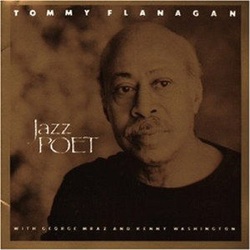|
Tommy Flanagan: Jazz Poet
When pianist Tommy Flanagan died in 2001 at the age of 71, the jazz world lost one of its most admired, most vibrant artists, a gentle, self-effacing man who yet stood second to none, a pianist whose playing was both elegant and sure-handed. Flanagan grew up in Detroit, one of America’s great jazz cities, as did such other luminaries as Hank, Thad and Elvin Jones, Kenny Burrell, Yusef Lateef, Donald Byrd and Barry Harris, among others. It was in Detroit—perhaps at the Blue Bird Inn, where Flanagan played regularly for many years—that Flanagan then about 17 years old, looked up from the piano one night to see one of his great heroes, Charlie Parker himself, attaching the mouthpiece to his alto saxophone. “‘Moon‘ in G,” Parker told him, calling “How High the Moon.” “Give me four bars.” And he counted out a tempo, a brisk one. “One-two, one-two-three-four.” And the young Flanagan was off and running. He must have felt he’d acquitted himself well that night with Bird because not long thereafter Tommy Flanagan moved on to the big time, to New York City, which he made his home base for the rest of his playing life. For much of his career, Flanagan was known as a sideman and accompanist, performing and recording with such artists as Coleman Hawkins, Thad Jones, Kenny Burrell, Tony Bennett and, notably, Ella Fitzgerald, with whom he toured and served as accompanist and music director for many years. Among the recordings he played on, a number are now considered classic albums: John Coltrane’s watershed “Giant Steps,” “The Incredible Jazz Guitar of Wes Montgomery,” and Sonny Rollins’s “Saxophone Collosus.” Finally, as a leader, Tommy Flanagan delivered his own classic jazz album, Jazz Poet, certainly one of the most collectible recordings in jazz. It was the writer Whitney Balliett who, witnessing Flanagan’s ability to draw out of the piano such luminous arrays of colors and textures, conjuring up what seemed to him sheer poetry, dubbed him aptly the “Jazz Poet.” A pianist who combined both muscularity and grace, he employed a single-note style of piano playing reflecting the influence on him of horn players, most particularly that of Charlie Parker. Along with Flanagan on “Jazz Poet,” we have bassist George Mraz and drummer Kenny Washington. Mraz, a longtime sideman of Flanagan, plays with perfect time and with such control of his instrument that he’s able to execute whatever musical idea comes into his mind, and what comes into his mind is consistently inspired. Washington, a direct drumming descendant of “Philly” Jo Jones, was then and still is one of the most tasteful drummers on the scene. His way with brushes is second to none. The playlist on “Jazz Poet” combines some Great American Songbook chestnuts (“Willow Weep for Me,” “I’m Old-Fashioned”) with some somewhat lesser known gems (Strayhorn’s “Raincheck,” Matt Dennis’s “That Tired Routine Called Love”). Tommy Flanagan didn’t often choose to play the blues, but for this occasion he made an exception, choosing the iconic “St. Louis Blues.” To say “Jazz Poet” is highly recommended is to understate. If this one is not already in your collection, do yourself a favor and run out and give yourself a belated Christmas present. —Terry MacDonald Track Listing
|
Copyright ©2024 Seacoast Jazz Society, All Rights Reserved



